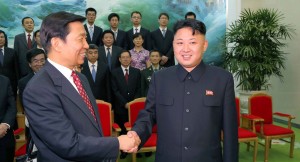China and its Neighbours
China and its Neighbors
The Relations between China and the North Korea
China is North Korea’s most important ally, biggest trading partner, and main source of food, arms, and energy. The country has helped sustain what is now Kim Jong-un’s regime, and has historically opposed harsh international sanctions on North Korea in the hope of avoiding regime collapse and a refugee influx across their border. But after Pyongyang’s third nuclear test in February 2013, analysts say that China’s patience with its ally may be wearing thin. This latest nuclear test, following previous ones in 2006 and 2009, has complicated North Korea’s relationship with Beijing, which has played a central role in the Six Party Talks, the multilateral framework aimed at denuclearizing North Korea. The December 2013 execution of Jang Song-taek, Kim Jong-un’s uncle and adviser with close ties to Beijing, spurred renewed concern from China about the stability and direction of the North Korean leadership. Furthermore, experts say that thawing relations between China and South Korea could shift the geopolitical dynamic in East Asia and undermine the China-North Korea alliance.
An Historic Alliance Under Stress
China’s support for North Korea dates back to the Korean War (1950-1953), when its troops flooded the Korean Peninsula to aid its northern ally. Since the war, China has lent political and economic backing to North Korea’s leaders: Kim Il-sung (1912-1994), Kim Jong-il (1941-2011), and Kim Jong-un (1983-).But strains in the relationship began to surface when Pyongyang tested a nuclear weapon in October 2006 and China supported UN Security Council Resolution 1718, which imposed sanctions on Pyongyang. With this resolution—as well as earlier UN sanctions that followed the DPRK’s July 2006 missile tests—Beijing signaled a shift in tone from diplomacy to punishment, which it sustained after Pyongyang’s second nuclear test in May 2009. However, the PRC also pursued comprehensive engagement with North Korea on the occasion of Prime Minister Wen Jiabao’s visit to North Korea in October of 2009 to mark the sixtieth anniversary of the establishment of Sino-DPRK relations. Following North Korea’s third nuclear test in February 2013, Beijing returned to a harsher approach, summoning the North Korean ambassador to its foreign ministry to protest Pyongyang’s third nuclear test, implementing new trade sanctions, reducing energy supplies to North Korea, and calling for denuclearization talks. However, it stopped short of the harsh criticism it unleashed in 2006, when it described the North’s first nuclear test as “brazen.”
Pyongyang’s Gains
China provides North Korea with most of its food and energy supplies and comprises over sixty percent of its total trade volume. Nicholas Eberstadt, senior fellow at the American Enterprise Institute, says that since the early 1990s, China has served as North Korea’s chief food supplier and has accounted for nearly 90 percent of its energy imports. North Korea’s economic dependence on China continues to grow, as indicated by the significant trade imbalance between the two countries. Some experts see the $1.25 billion trade deficit as an indirect Chinese subsidy, given that North Korea cannot finance its trade deficit through borrowing.







 This is the default footer layout. You can easily add or remove columns in the footer.
This is the default footer layout. You can easily add or remove columns in the footer.
Recent Comments